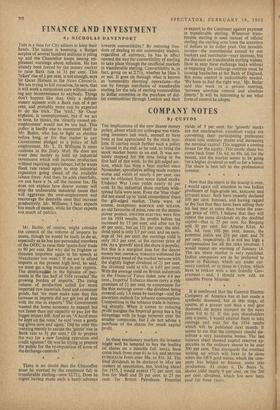B y NICHOLAS DAVENPORT Tots is a time for City editors
to keep their heads. The nation is booming, a Budget surplus of several hundred millions is piling up and the Chancellor keeps issuing un- pleasant warnings about inflation. He has already been forced by the money market to raise Bank rate to 34 per cent. This 'token' rise of 1 per cent, is not enough, says Sir Oscar Hobson in the News Chronicle. We are trying to kid ourselves, he says, that it will work a miraculous cure without caus- ing any inconvenience to anybody. Things don't happen like that. Only a definite money squeeze with a Bank rate of 4 per cent. and probably more can be expected to do the trick. The 'trick,' Sir Oscar explains, is unemployment, but if we act in time, he thinks, the 'directly caused un- employment' would not be too bad. This policy is hardly one to commend itself to Mr. Butler, who has to fight an election before long, or for that matter to any Government pledged to a policy of full employment. Mr. L. a Williams is more cautious in the Daily Mail. He does not want dear money to hold up industrial investment which will increase production without requiring more labour, but he wants Bank rate raised again to stop industrial expansion going ahead of the available labour force. And then, he adds cheerfully, we can have a Is. off the income tax. He does not explain how dearer money will stop the undesirable industrial issues that will aggravate the over-employment and encourage the desirable ones that increase productivity. Mr. Williams, I fear, expects 'too much of money, while Sir Oscar expects too much of politics.
towards convertibility? By restoring free- dom of dealing to our commodity traders, regardless of currency, he has in effect opened the way for convertibility of sterling to take place through the unofficial markets in transferable sterling. Convertibility is, in fact, going on at 2.714, whether he likes it or not. It goes on through what is known as 'commodity shunting' operations—the use by foreign merchants of transferable sterling for the sale of sterling commodities to dollar countries or the purchase of dol- lar commodities through London and their
re-export to the Continent against payment in transferable sterling. Whenever trans- ferable sterling is used instead of official sterling the sterling area loses the accretion of dollars to its dollar pool. Our invisible income—the commissions earned by our bankers and merchants—may increase, but the discount on transferable sterling widens. How to stop these exchange leaks without re-imposing the exchange controls must be causing headaches at the Bank of England. But some control is undoubtedly needed. 'We have to find the right way,' Mr. Butler said this week to a private meeting. 'between absolute control and absolute liberty.' It will be interesting to see what form of control he adopts.










































 Previous page
Previous page